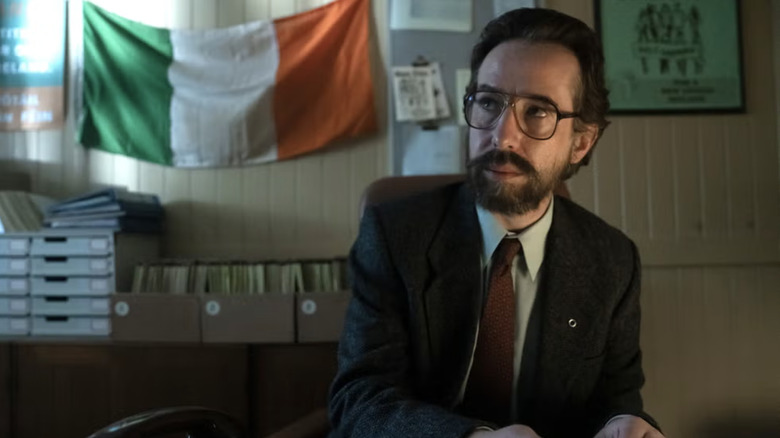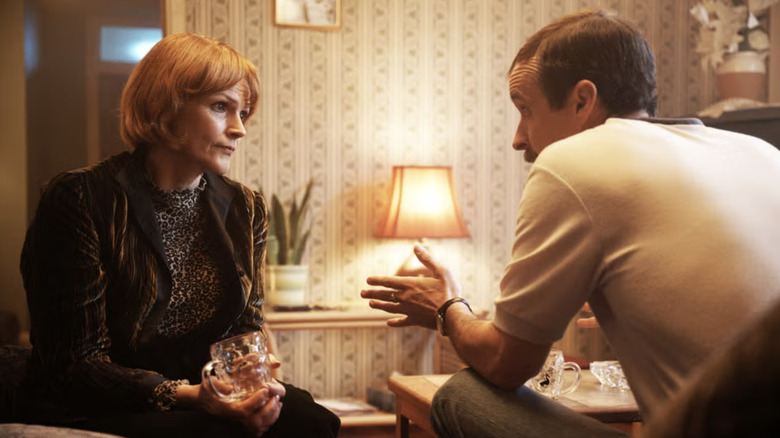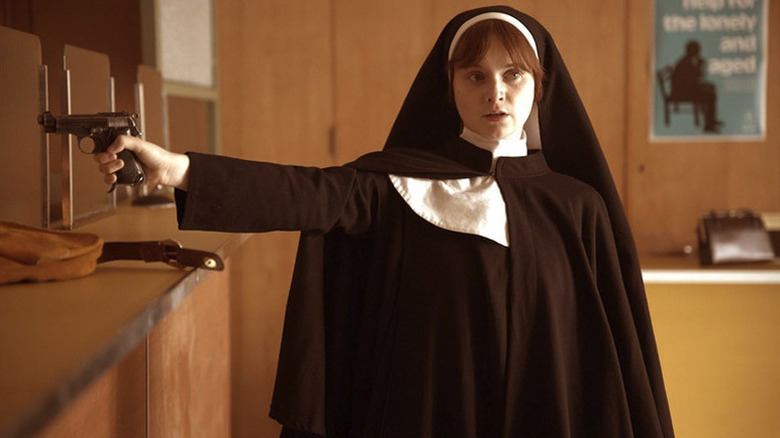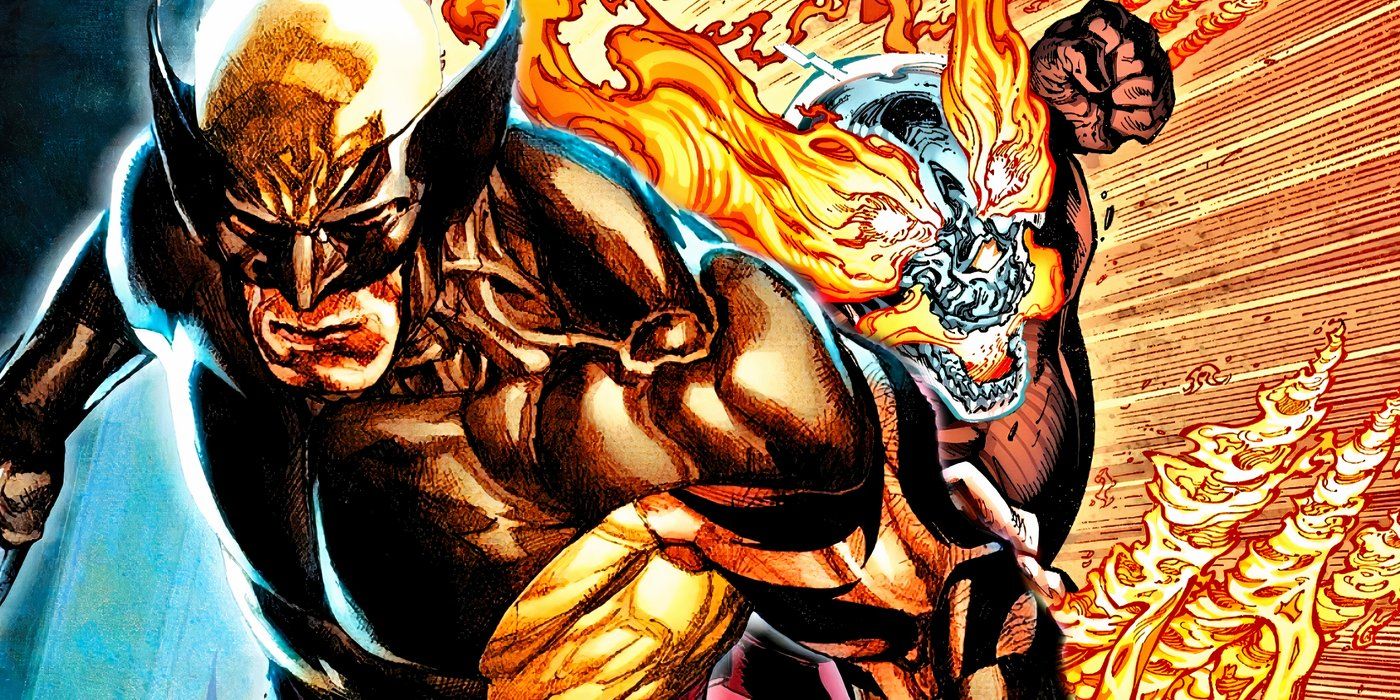
FX
/Film has proudly declared the FX mini-series "Say Nothing" some of 2024's best TV, and I could not agree more. Based on an acclaimed non-fiction book by Patrick Radden Keefe, "Say Nothing" is (as the book is subtitled) a "True History of Memory and Murder in Northern Ireland." The story chronicles a half-century of political dissent, threaded through the disappearance and murder of single mother (and alleged British informant) Jean McConville. The two characters we most follow through that thread are Dolours and Marian Price, two sisters inspired to join the Irish Republican Army (IRA) by the failures of peaceful protest and their family's long association with the organization.
Quick history lesson: in 1921, Ireland was partitioned between the 26 free counties and the six Northern counties that remained under British rule. With a majority population of Protestant Unionists, these counties would seemingly never have a popular majority to secede. The Catholic Republicans in Northern Ireland, though, kept the dream of (and struggle for) a United Ireland alive. Some with quiet prayers and activism, some with what many called terrorism.
Now, I knew these broad strokes before watching "Say Nothing," and not just from reading Radden Keefe's book a couple of years earlier. I'm Irish-American; my mother's family is from Cork, and my father's is from Tyrone (one of the six Northern counties). Learning that made the split feel palpable to me, even if I didn't at first grasp the political complexities. Hearing my paternal great-grandfather was part of the Irish Republican Brotherhood before leaving for America in the 1920s? I latched onto the adventure of that, conceiving of him as a heroic freedom fighter who had no choice but to flee. "Sinn Féin" might as well have translated to "good guys" in my head.
Many Irish-Americans like to over-identify with the first part of their heritage, even though it's obviously the more distant one. I can be certainly guilty of that; in my early 20s, my conviction that there should be a United Ireland grew and grew, even though it would only bring me satisfaction on the principle of it. I'd listen to old Irish rebellion anthems, from "Come Out 'Ye Black and Tans" to "The Rising of the Moon," as simple uplifting tunes. Even in films where the IRA are condemned as terrorists, with the foot soldiers being misguided and leadership corrupt (e.g.,"The Crying Game"), half of me would root for them. "They're doing it for a good cause," I'd think, but the nuance I can now understand is that following a good cause doesn't automatically make one a hero.
I visited Ireland for the first time in December 2022 and brought along the copy of "Say Nothing" I'd been putting off reading. I was finally going to see and step foot in Ireland, so what better pastime than a history book about the country I would be absorbing. By the end of it, though, my convictions were tempered. I still side with Irish Republicanism more than not, and the ultimate villain of this history is the British Empire, but I can't comfortably dismiss the description of the IRA as terrorists anymore. Watching the show render these events plain as the eye could see reminded me of how Radden Keefe's words shook my beliefs out of place.
Irish-Americans love the IRA

FX
Another stereotype of Irish-Americans is that they're the staunchest supporters of the IRA; the diaspora support the struggle more than the people actually struggling. NORAID is an Irish-American committee formed in 1969 to financially support the IRA and the armed struggle for a United Ireland.
On page 248 of "Say Nothing," Radden Keefe concisely writes:
"It could occasionally seem that support for the armed struggle was more fervent in Boston or Chicago than it was in Belfast or Derry. The romantic idyll of a revolutionary movement is easier to sustain when there is no danger that one's own family members might get blown to pieces on a trip to the grocery store."
In a moment sadly excluded from the show, IRA leader Brendan Hughes (played by Anthony Boyle in "Say Nothing") takes a trip to the state to secure NORAID funding and guns. In doing so, he nearly gets in a fist fight with his sponsors after they try to give him instructions on how to wage the war (like killing British mailmen) and turn their nose up at the IRA's revolutionary socialism.
I know firsthand how these cultural myths get passed down. If you're an Irish-American Catholic whose family came from the North, you've undoubtedly heard stories of how the Catholics were oppressed and needed to flee. That feeling can light the fire of nationalism in your belly, but for the idea of Ireland instead of the reality.
Radden Keefe is Irish-American, but not one who bought into that mythology. He didn't want to write about the Troubles to better understand the land his family came from, but because he was intrigued by the people and "moral complexity" that had shaped that land's recent history. How could people be so swept up by a cause they'd happily kill and die for it, only to become disillusioned later, and how could those same people who waged a militia campaign settle back into the communities they'd planted bombs in?
Speaking to Vulture, Boyle explained that when he committed to starring in "Say Nothing," he agreed with Keefe and series creator Josh Zetumer that they shouldn't try and define the "messy, checkered history" of the Troubles, but rather "ask questions and connect to the humanity of it." The most effective way to reaching, or even changing, hearts can be to remove ideology and let the human impact speak for itself.
Say Nothing chronicles a revolution betrayed

FX
"Say Nothing" chronicles the Troubles from the POV of the Provisional Irish Republican Army that instigated them. The scope of the show naturally can't match the book's (in a visual narrative, you need concrete characters to build sustained scenes around) but even where it streamlines, it evokes the same feelings.
In episode 1, "The Cause," the Price sisters first attempt to use peaceful protest for full Catholic rights. Then, we watch as these marchers are ambushed by unionists, boxed in by the police, and savagely beaten. The scene will make you feel rage at the injustice and is all you need to understand Dolours (Lola Petticrew) and Marian's (Hazel Doupe) actions. If your peaceful pleas for reform are met with violence, then doing violence yourself will seem like the only just countermeasure.
The Prices, Hughes and other hardline IRA soldiers like them felt betrayed by Gerry Adams, the (long-alleged) Belfast IRA leader. In 1983, he was elected to the U.K. Parliament for Belfast and became President of Sinn Féin, then ultimately brokered the 1998 Good Friday Agreement that brought self-governance and soft border (but not complete independence) to Northern Ireland.
On its own terms, the peace process that Adams shepherded was a success. The violence stopped and we're closer and closer to a United Ireland even if (despite what "Star Trek" predicted) we're not getting there in 2024. Northern Ireland is now majority Catholic and, in 2022, the Irish language was officially recognized as the country's language.
But if you go by "Say Nothing" the TV show, you might not realize that. It glosses over Adams' positive impacts because the point of the story isn't about how to make a United Ireland a reality or if we should. (Radden Keefe implicitly condemns the IRA's extreme actions, but maintains journalistic agnosticism on their goals.) It's instead about how people like Dolours Price and Brendan Hughes came to see Adams as a traitor. They killed friends and sold their souls for a truly united, British-free Ireland. For all its progress, that's not what the Good Friday Agreement was.
Dolours and Brendan have to live under the fog of the years they spent bleeding and killing for a United Ireland, justifying it with "Tiocfaidh ár lá," except that day never did come. That Keefe infers Adams is the one who ordered the murder of McConville (he was arrested on the charge in 2014, but released due to insufficient evidence) makes him washing his hands of violence all the more galling.
Facing disillusionment and feeling their loyalty was unrewarded, Price and Hughes channeled their guilt into cooperating with Boston College's Belfast Project oral history, recounting what they did to leave a lesson behind and possibly inspire a reckoning. (Atonement through confession — how very Catholic of them.) The Belfast Project tapes of Hughes and Price were some of Keefe's primary sources, and their recording is the framing device of the TV series.
Say Nothing reels you in like a gangster movie does

Rob Youngston/FX
Watching "Say Nothing" is like watching a gangster movie, from the sweeping rise to the depressing fall. In "The Cause," Dolours takes a pledge of loyalty to the IRA that mostly sounds like a military oath, barring the vow to remain silent right out of the Omertà. Episode 2, "Land of Password, Wink, and Nod," opens with the Price sisters robbing a bank disguised as nuns. (The teller, a Catholic, helps them and speaks in Irish so her boss doesn't realize.) Episode 6, "Do No Harm," is a prison-set episode following Dolours and Marian's eight-year imprisonment after they're arrested and convicted for bombing London.
It's in episode 3, "I'll Be Seeing You," where the bloody reality sets in. Dolours gets the new assignment of driving informants over the southern border to their deaths. The long scenes of car rides carrying dead men walking bring to mind the quote from "Donnie Brasco" about how the Italian-American Mafia handled problems: "When they send for you, you go in alive, you come out dead, and it's your best friend that does it."
Episode 4, "Tout," shows how Republicanism became a religion for Northern Irish Catholics, when a woman turns her own husband in for being a British informant (a failed effort to buy him clemency, granted). Adams maintains a hardline no-forgiveness rule for the informants, saying it's for the good of the cause, whereas Hughes is more torn-up about killing his own men, arguing, "The men are the cause." By the end of "Tout," you realize the IRA are killing their own people, the ones they're supposedly fighting to liberate, more than they are the British occupiers.
That's how "Say Nothing" dashes idealistic Irish-American notions of the IRA: by putting names to the soldiers and the victims. Violence in dire circumstances can be justified as an inevitable response, but leaving a family of 10 child orphans? The same children who the IRA was supposedly fighting on behalf so they might live in a free country? I can't condone it.
Now, "Say Nothing" did not flip my perspective. Some of the IRA's actions are indefensible but that still pales in comparison to the 800 years of British subjugation of Ireland. In episode 5, "Evil Little Maniacs," when the Prices bomb London, I silently nodded when Marian threw Bloody Sunday back in the face of the British policeman interrogating her. (This refers to the 1972 massacre where British soldiers killed 26 peacefully protesting civilians in Northern Ireland.) The institutionalized discrimination against Catholics in the North of Ireland was an injustice that couldn't stand either.
What "Say Nothing" has given me is new wariness about submitting yourself over to a cause so completely that any act carried out in its name can be justified.
"Say Nothing" is streaming on Hulu.









 English (US) ·
English (US) ·